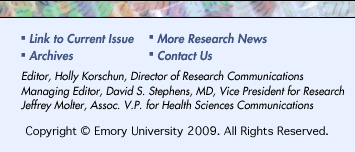 |
 |
|||
| November 11, 2009 | ||||
 David Schulman, MD, MPH David Schulman, MD, MPH |
Sound Science: Putting Sleep Disorders to Rest Listen to Sound Science as David Schulman, MD, MPH, discusses sleep and what happens when we can't get enough of it. Schulman is medical director of Emory's Sleep Laboratory, a multi-disciplinary group of clinicians and researchers. He tells how a chronic lack of sleep can affect long-term health, and what you can do to help. Read and listen. . . |
|||

Emory nursing researchers work with farmworkers |
Improving Health for Pregnant Farmworkers Exposure to agricultural chemicals is a major hazard for pregnant farmworkers, along with heat, dehydration, and long periods of standing. With a new CDC grant, Emory nursing school faculty aim to improve the health of pregnant women and their unborn babies. Read more. . . |
|||
Emory Ranked 5th Best Place to Work for Life Scientists The Scientist magazine's readers gave Emory a high ranking among 94 U.S. institutions as a workplace for life scientists. Overall, survey respondents focused on collaboration, team building, and unique funding opportunities. Emory ranked especially high in categories of "peers" and "job satisfaction." Read more. . . |
||||

Jonathan Glass, MD, PhD |
ALS Researchers Seek a Breakthrough Emory's ALS Center offers patients therapy and support, but the center's research is focused on studies of motor neuron degeneration, genetics, and experimental drug treatments scientists hope will change the course of this devastating condition. Lou Gehrig's disease impacts axons—nerve fibers in the brain that connect the nervous system to the outside world through the muscles and skin and control the ability to feel and move. Read more. . . |
|||
"Conveyor Belt" Cell May Be Key to Improved Oral and Nasal Vaccines A protein called RANKL, found in the intestines, could help scientists develop more vaccines that are given through the nose and mouth, where many bacteria and viruses enter the body. RANKL is essential for the proper development of M cells, which may be a key to effective mucosal vaccines. Read more. . . |
||||
 |
 |
|||

